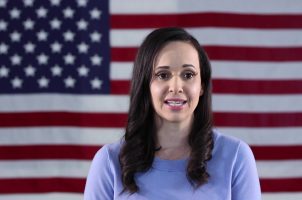Congressman Wants Sports Betting Commercials Taken Off the Air
Posted on: February 10, 2023, 07:01h.
Last updated on: February 10, 2023, 01:55h.
In the nearly five years since The Professional and Amateur Sports Protection Act of 1992 (PASPA) ruling by the Supreme Court, one question that’s remained unanswered is will the federal government look to regulate the sports betting industry. On Thursday, a veteran congressman called for a crackdown on sportsbook advertising.

US Rep. Paul Tonko, D-NY, said in a statement that Washington needs to act as sports betting ads lure people – especially teenagers and young adults – into an addictive habit. That’s why he filed the Betting on Our Future Act.
As stated in the bill, Tonko wants “to prohibit the advertising of sportsbooks on any medium of electronic communication subject to the jurisdiction of the Federal Communications Commission.” In a fact sheet his office produced, that would include television and radio commercials, as well as online advertisements.
The excessive, uncensored promotion of these sites needs to be put in check,” Tonko said. “My legislation puts a halt to this dangerous practice and sends a powerful message to the online sports betting advertisers. Congress must take the necessary steps to reel in an industry with the power to inflict real, widespread harm on the American people.”
Tonko said he modeled his legislation after the federal law that bans cigarette advertising.
This isn’t Tonko’s first gaming-related bill. Previously, he worked closely with US Rep. Andy Barr, R-Ky., over several years on legislation that would ultimately become the Horseracing Integrity and Safety Act.
Concerns About Exposure
Sports betting is now legal in 36 states and operational in 33, plus the District of Columbia. Mobile wagering is currently available in 23 states and in DC.
Sports betting operators have faced heavy scrutiny in recent months. The Ohio Casino Control Commission announced it will punish four operators for violating advertising and responsible gambling standards. Caesars Sportsbook has already agreed to pay a $150K fine, while BetMGM, DraftKings, and Penn Sports Interactive face similar or larger fines.
A New York Times exposé late last year cast a light on some of the practices sportsbooks have employed to promote their brands and attract new customers. That included signing partnership deals with such institutions as the University of Colorado, Louisiana State University, and Michigan State University.
It’s not just college-age students who are at risk, according to Tonko. He believes the flashy ads with high-profile celebrities and former athletes make sports betting seem appealing to an even-younger crowd.
In the years since the Supreme Court legalized sports betting, these unfettered advertisements have run rampant, with betting companies shelling out billions to ensure they reach every screen across America,” the lawmaker said. “These ads pose a particularly dangerous threat to adolescents and young adults unaware of the risks involved in gambling, and to individuals prone to addiction.”
In most states where it is legal, the minimum age to place a bet on a sporting event is 21. However, there are several that allow individuals as young as 18 to make a wager.
Tonko cited statistics from the International Center for Youth Gambling Problems & High-Risk Behaviors, which estimates that up to 80% of high school students have risked money through gambling.
Tonko Says Operators Use Predatory Tactics
Regulated sports betting has become a big business across the country in a relatively small amount of time. According to the American Gaming Association, sportsbooks, both retail and online, generated more than $6.5 billion in gross gaming revenue through the first 11 months of 2022. That was a 65.4% increase from the same time span in 2021.
In states where online wagering is allowed, the vast majority of bets and revenue come from bets placed on mobile apps and websites.
As sports betting has expanded across the country, so, too, have calls to addiction helplines. Tonko’s fact sheet notes that the National Problem Gambling Helpline Network took 270K calls in 2021, a 45% increase from the previous year.
The congressman accused the sports betting operators of using predatory tactics in their efforts to lure new customers to their apps and sites. He added that this weekend’s Super Bowl broadcast will be a big one for sportsbooks.
“Between the plays, the halftime show, and the excitement, tens of millions will be bombarded by ad after ad from DraftKings, FanDuel, and others promising so-called ‘risk-free’ or ‘no sweat’ bets in their ruthless pursuit to get new customers hooked on their products,” Tonko said.
According to a BIA Advisory Services forecast last August, online gambling operators were expected to spend $1.8 billion on local advertising in 2022. That’s more than 60% of those companies’ advertising dollars.
BetMGM, Caesars, DraftKings, and FanDuel – widely considered the top four operators in the US – have also embraced national advertising. Commercials featuring the Manning family, Jamie Foxx, Kevin Hart, and Rob Gronkowski air during most broadcasts of major sporting events.
BetMGM, Caesars, and DraftKings didn’t respond to requests for comment on Thursday. A FanDuel spokesperson said the company won’t comment on the legislation.
Analysis: Does the Bill Have a Shot?
Lawmakers file thousands of bills during the two-year congressional sessions. Very few of those bills will actually make it through the entire legislative process to become law. Often, filing a bill is a way to show they’re taking a stand on an issue and want to see it gain more attention.
With Republicans being the majority party in the House, it makes it harder for a bill led by a Democrat to make it through. However, gaming issues tend to bring together factions from both parties. So, the bill may gain support, especially if more raise concerns about sports betting operators.
If that happens, I would expect a significant response from the operators and the American Gaming Association (AGA). Any move to restrict or regulate advertising would almost certainly be met with resistance, especially since the AGA has repeatedly called on Washington to do more to stop offshore books and illegal gaming operators.
The bill may also serve as a wake-up call for the industry to take more initiative and self-police itself. Some, like FanDuel doing away with using the phrase “risk-free,” have taken steps. But clearly, more is needed.
Related News Articles
California Sports Betting Update: State GOP Says No to Both Measures
Most Popular
LOST VEGAS: The Foster Brooks Robot at MGM Grand
Bally’s Sets Date for Tropicana Las Vegas Implosion & Party
Most Commented
-
VEGAS MYTHS RE-BUSTED: You Don’t Have to Pay Resort Fees
— August 2, 2024 — 16 Comments -
VEGAS MYTHS RE-BUSTED: Elvis Was a Straight-Up Racist
— August 9, 2024 — 11 Comments -
ANTI-SOCIAL BEHAVIOR: Vegas Casino Buffet Stunt in Poor Taste Goes Viral
— August 16, 2024 — 7 Comments -
VEGAS MYTHS RE-BUSTED: The Strip Tried Appealing to Families and Failed
— August 23, 2024 — 7 Comments
















No comments yet